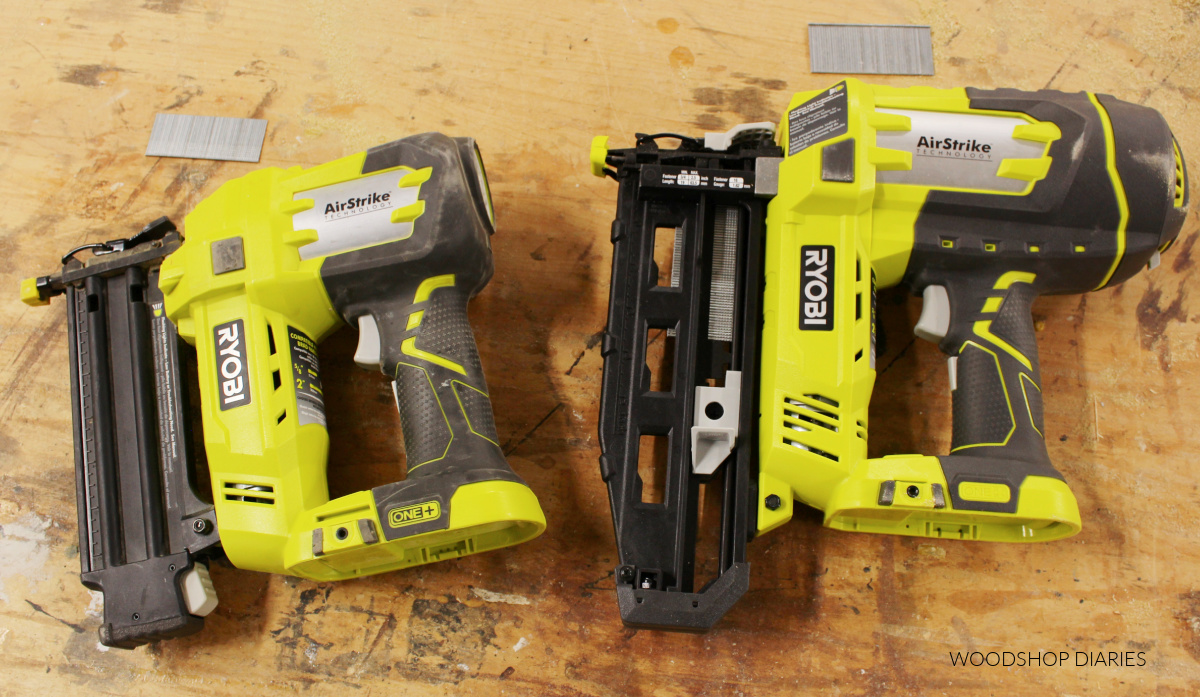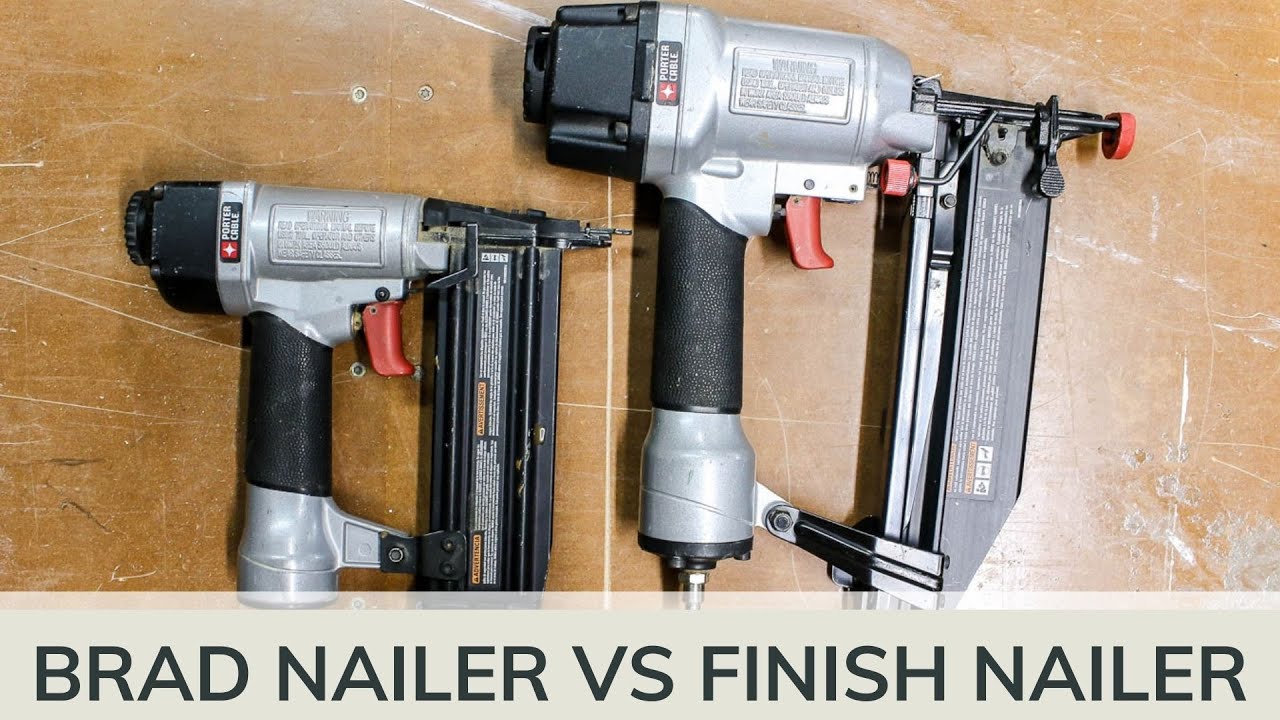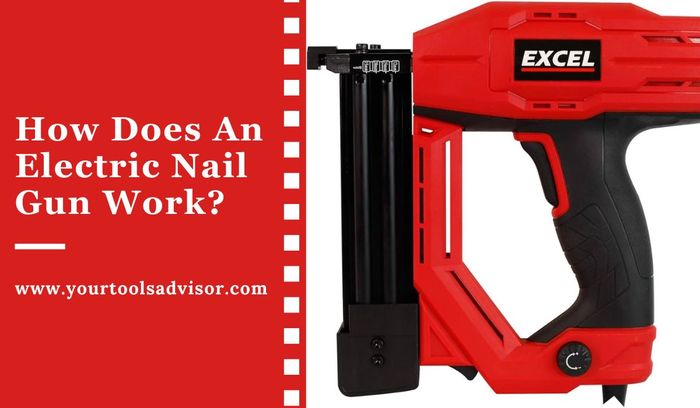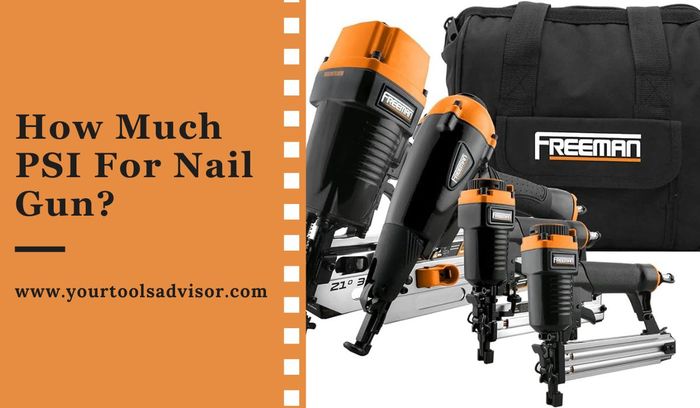The Ryobi Brad Nailer is used for smaller woodworking projects, while the Finish Nailer is for more extensive woodworking projects. Are you in the market for a new nailer and trying to decide between a Ryobi Brad Nailer and a Finish Nailer?
These two tools may appear similar, but they serve different purposes. The Ryobi Brad Nailer is primarily used for smaller woodworking projects, such as trim work and cabinetry. On the other hand, the Finish Nailer is designed for more extensive woodworking projects, like installing baseboards and crown molding.
We will compare these two nailers to help you make an informed decision based on your specific needs and project requirements. So let’s dive in and explore the differences between the Ryobi Brad Nailer and the Finish Nailer.
Overview Of Ryobi Brad Nailer And Finish Nailer
| Overview of Ryobi Brad Nailer and Finish Nailer |
Ryobi offers both Brad Nailer and Finish Nailer options for different woodworking applications. Both nailers are reliable and versatile, but they serve different purposes.
Features And Characteristics
The Ryobi Brad Nailer is perfect for intricate finishing work and smaller projects. It uses 18-gauge brad nails, providing precise and clean nail placement. The lighter weight and compact design make it easy to handle in tight spaces.
On the other hand, the Ryobi Finish Nailer is designed for larger projects that require heavier-duty nailing. It uses 16-gauge or 15-gauge nails, providing enhanced strength and stability. The magazine capacity is usually higher, allowing for longer periods of work before reloading.
- The Brad Nailer excels in precision and versatility for detailed finishing work.
- The Finish Nailer is suitable for heavy-duty projects that require additional strength.
- Both nailers are cordless, providing freedom of movement and portability.
- Ryobi tools are known for their durability and reliability.
- The Brad Nailer may not provide enough power for certain applications that require more force.
- The Finish Nailer can be slightly bulky and less maneuverable in tight spaces.

Credit: www.woodshopdiaries.com
Power Source
When it comes to power sources, the Ryobi Brad Nailer and Finish Nailer offer two different options.
The Ryobi Brad Nailer is battery-operated, which provides the convenience of portability. This means you can use it anywhere without the need for an electrical outlet. The battery-powered design also eliminates the hassle of dealing with cords and cables, allowing for easy maneuverability.
On the other hand, the Finish Nailer requires an air compressor for operation. This means you need to have access to an air compressor and ensure it is running properly. While using an air compressor may limit mobility, it does provide consistent and reliable power for the nailer, making it ideal for heavy-duty applications.
Nail Size And Length
When comparing the Ryobi Brad Nailer and the Finish Nailer, one important factor to consider is the nail size and length. Both nailers are designed to accommodate different nail sizes, and it is crucial to choose the one that is compatible with your specific needs.
The Ryobi Brad Nailer is suitable for smaller nails, typically ranging from 18-gauge to 23-gauge. These nails are thinner and shorter, making them ideal for delicate woodworking tasks or projects that require a discreet finish. On the other hand, the Finish Nailer is designed for larger nails, usually between 15-gauge to 16-gauge. These nails are thicker and longer, providing higher strength and durability.
| Nailer | Maximum Nail Size |
|---|---|
| Ryobi Brad Nailer | 23-gauge |
| Finish Nailer | 16-gauge |
Therefore, before deciding between the Ryobi Brad Nailer and the Finish Nailer, consider the type of projects you frequently work on and the nail size required. By choosing a nailer that is compatible with the desired nail size and length, you can ensure efficient and effective results.
Applications And Use Cases
Ryobi brad nailers and finish nailers are both powerful tools with different applications and use cases. Brad nailers are typically used for lighter woodworking projects that require delicate precision. They are perfect for projects such as trim work, crown molding, baseboards, and paneling installation. Since brad nails have smaller heads, they leave behind minimal visible marks, which makes them ideal for projects that require a clean and seamless finish.
On the other hand, finish nailers are designed for heavier-duty tasks. They are more suitable for projects that require a stronger hold and are less concerned about visible nail heads. Finish nailers are commonly used for larger woodworking projects like building furniture, cabinetry, staircases, and deck framing. They can handle thicker and longer nails, allowing for a more secure and stable structure.
Project Type
Woodworking projects can vary widely in their scope and complexity, and it’s important to choose the right tool for the job. Whether you’re working on a DIY project or engaged in professional woodworking, considering the project type is crucial.
Types Of Woodworking Projects
| Project Type | Ryobi Brad Nailer | Finish Nailer |
|---|---|---|
| Furniture | Perfect for attaching small trim pieces and moldings. | Best suited for larger trim and finish work, such as attaching baseboards and crown moldings. |
| Cabinetry | Ideal for assembling cabinet frames and attaching thin panels. | Best for installing cabinet doors and attaching thicker panels. |
| Trimming and Molding | Great for delicate molding work and installing trim on doors and windows. | Suitable for heavy-duty trim work and larger moldings. |
Choosing between a Ryobi Brad Nailer and a Finish Nailer primarily depends on the project you’re undertaking. While both tools can be used for various woodworking projects, understanding the specific requirements of your project is key to making the right choice.
Convenience And Portability
Convenience and portability are important factors to consider when choosing between a Ryobi Brad Nailer and a Finish Nailer. One of the key differences between the two is their weight and size. The Brad Nailer is typically lighter and more compact, making it easier to handle and maneuver in tight spaces. This is especially beneficial for jobs that require frequent movement or overhead work. On the other hand, the Finish Nailer is larger and heavier, providing more power and stability for heavy-duty applications. It is better suited for projects that involve thicker materials and require a more robust tool.
Ultimately, the choice between the Ryobi Brad Nailer and the Finish Nailer depends on the specific needs and preferences of the user. Whether you prioritize convenience and ease of maneuverability or power and durability, both options offer their own advantages. Consider the nature of your projects and the level of portability required to make an informed decision.
Budget And Cost
Ryobi offers a range of brad nailers and finish nailers that cater to different budgets and cost considerations. The price range comparison between Ryobi brad nailers and finish nailers is quite diverse. Generally, brad nailers tend to be more affordable and fall within a lower price range, making them a suitable choice for budget-conscious individuals. Finish nailers, on the other hand, are often priced slightly higher due to their added features and versatility.
When deciding between a brad nailer and a finish nailer, it’s essential to consider long-term investment considerations. While a brad nailer may be more budget-friendly initially, a finish nailer offers more functionality and is capable of handling a wider range of tasks. This can be advantageous if you foresee yourself using the tool extensively in the future, as it provides better value over time.
Ultimately, the choice between a Ryobi brad nailer and finish nailer depends on your specific needs, preferences, and budget. Taking into account the price range comparison and long-term investment considerations will assist you in making an informed decision.
Frequently Asked Questions On Ryobi Brad Nailer Vs Finish Nailer
What Is The Difference Between Ryobi Brad Nailer And Finish Nailer?
The main difference between a Ryobi brad nailer and a finish nailer is the size of the nails they use. A brad nailer is designed for smaller, delicate jobs, while a finish nailer is used for larger, more heavy-duty projects.
Which Is Better Brad Nailer Or Finish Nailer?
The choice between a brad nailer and a finish nailer depends on the task at hand. A brad nailer is ideal for delicate woodworking projects and securing thin materials, while a finish nailer works best for heavier trim and molding.
When Not To Use A Brad Nailer?
Avoid using a brad nailer when working with heavy materials or when you need stronger and more secure fastening. Additionally, if you need a more permanent and durable hold, opt for other types of nails or screws as they provide better stability.
Can Brad Nailer Shoot Finish Nails?
Yes, a brad nailer can shoot finish nails.
Conclusion
To summarize, both the Ryobi brad nailer and finish nailer offer distinct advantages depending on your specific needs. The brad nailer excels in precision and versatility for delicate trim work, while the finish nailer provides more power for heavier applications.
Ultimately, choosing the right tool boils down to the type of project you’re working on. By understanding the differences between these two nailers, you can make an informed decision that suits your requirements. Happy nailing!





Leave a Reply